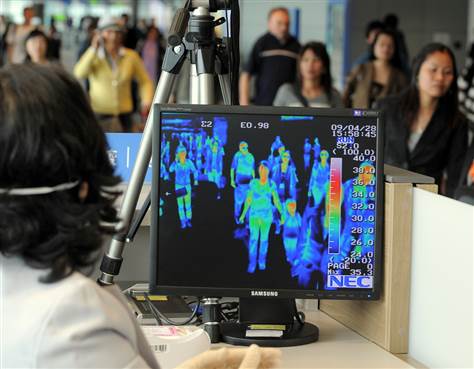What Constitutes A Fever When We Are Talking About The Coronavirus.
Source : Thailand Medical News Feb 11, 2020 5 years, 10 months, 1 week, 1 day, 20 hours, 36 minutes ago
Recently with thermal scanners everywhere from shopping centres to shopping malls, schools and office building and even at some prestigious massage parlours in
Thailand!, many locals and even foreigners are paranoid about their body temperature. The
coronavirus fear have in fact created a ‘social fever’ of its own.

Already with most of
Thailand especially Bangkok being hot and humid, many “farangs” (the term officially used by the Minister For Public Health with reference to white Caucasians, but local government officials have now proclaimed that it is actually an endearing term not the least derogatory) are panicking and paranoid in case their body temperatures might be too high and are detected and whisked off to some detention facility. Have seen for myself some stopping at public toilets and washing their hands, underarms and faces constantly to keep cool while a few other even carrying cool fever pads with them.
Despite the fact that Chinese researchers have now confirmed that almost 55% of those infected with the
coronavirus never showed any signs of fever and that many infected yet asymptomatic individuals do not exhibit any symptoms including fever, many ignorant officials and entities are still using it as a basis to screen those that could be infected with the
coronavirus.( refer to:
https://www.thailandmedical.news/news/alarming-news-new-chinese-research-on-coronavirus-finds-incubation-period-of-up-to-24-days)
So basically what constitutes a fever. Though most professionals say that the body temperature of a normal human being is 37 degrees Celsius or 98.6 degrees Fahrenheit, new studies have discovered that this is not.
New research published in eLife, shows
body temperature has not only dropped since German physician Carl Reinhold August Wunderlich's study in 1851 established the average
body temperature as 98.6 degrees, but it has also dropped since the 1970s. The findings indicate that the individuals' average,
normal body temperature has dropped about 0.05 degrees Fahrenheit (0.03 C) per decade, based on their birth year. (refer to:
https://www.thailandmedical.news/news/research-shows-that-average-normal-body-temperature-is-decreasing-and-no-longer-98-6-degrees-fahrenheit )
It must also be noted that body temperatures of children and adults also defer according to age.
For children, the temperature elevation that is considered "high" depends on the age of the child and the site where the temperature is measured.
For a healthy newborn or neonate, and young infants up to 3 months of age, a fever of health concern typically &nb
sp;defined by a temperature in the rectum of 38 deg C or higher.
For children aged three months to 3 years of age, fever generally is defined by rectal temperature ranging from 38 to 39 deg C. If there is no indication of infection when the child is examined, a fever of concern would be one in which the rectal temperature is 39 deg C or higher.
For older children a fever is defined by oral temperatures ranging from 37.8 to 39.4 deg C, while a fever of concern would be one in which an oral temperature is 39.5 deg C or higher.
For adults, a fever is generally defined by oral temperatures ranging from 37.6 to 39.4 deg C, while a fever of concern would be one in which an oral temperature is 39.5 deg C or higher.
Both older children and adults, the temperature under the armpit, also called axillary temperature, is considered to be abnormal when it is above 37.5 deg C.
It must be noted however that there are other variables that can affect body temperatures such as age, time of the day, level of activity and also gender. (females are affected by the menstrual cycle during which body temperatures can be slightly higher.)
Also children tend to have fever more often than adults due to their weaker immune system. It said common causes of fever in children are infections, overdressing by wearing clothes that are too thick, teething or vaccination.
When not sure if you are really having a fever or not, always visit a doctor to get properly examined and tested if necessary.
Never procrastinate if you are feeling unwell or attempt to self-treat as it can lead to serious health repercussions.
For latest developments and news about
coronavirus research, the
coronavirus epidemic or the
Thailand Coronavirus scenario, keep on checking at:
https://www.thailandmedical.news/articles/coronavirus
